
-
Find det rigtige foder til din kat eller hundTag denne quiz for at se, hvilket foder der kan være bedst for din firbenede ven.Find det rigtige foder til din kat eller hundTag denne quiz for at se, hvilket foder der kan være bedst for din firbenede ven.Udvalgte produkter
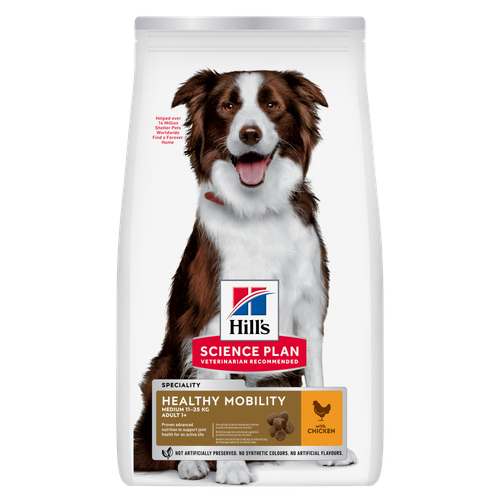 Healthy Mobility Medium Adult hundefoder
Healthy Mobility Medium Adult hundefoderHill's Science Plan Healthy Mobility Medium Breed Adult hundefoder med kylling er avanceret ernæring til at understøtte ledsundheden og forbedre mobiliteten.
køb nu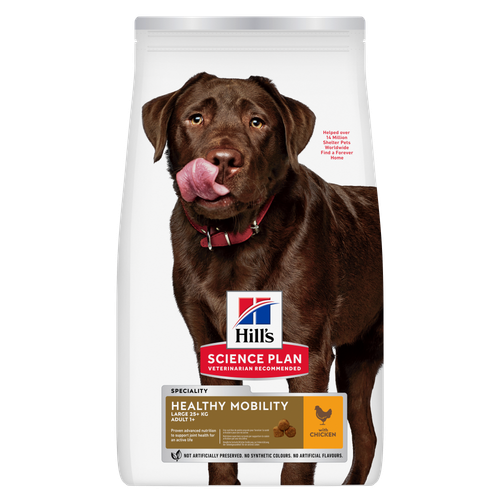 Healthy Mobility Large Breed Adult hundefoder
Healthy Mobility Large Breed Adult hundefoderHill's Science Plan Healthy Mobility Large Breed Adult hundefoder med kylling er avanceret ernæring til at understøtte ledsundheden og forbedre mobiliteten.
køb nu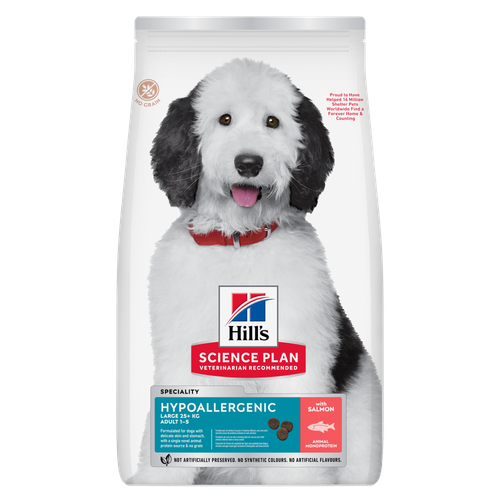 Hypoallergenic Large Breed Adult hundefoder med laks
Hypoallergenic Large Breed Adult hundefoder med laksHILL'S SCIENCE PLAN Hypoallergenic Medium Adult hundefoder med laks er et fuldfoder til voksne store hunderacer på 1-5 år. Det er sammensat til hunde med sart hud og mave, med begrænsede nye proteinkilder af høj kvalitet og uden korn.
køb nuLivsstadie-
Killing
2 Måneder – 12 Måneder
-
Voksen
1 År - 6 År
-
Ældre voksen
7 År – 11 År
-
Senior
11 År+
Udvalgte produkter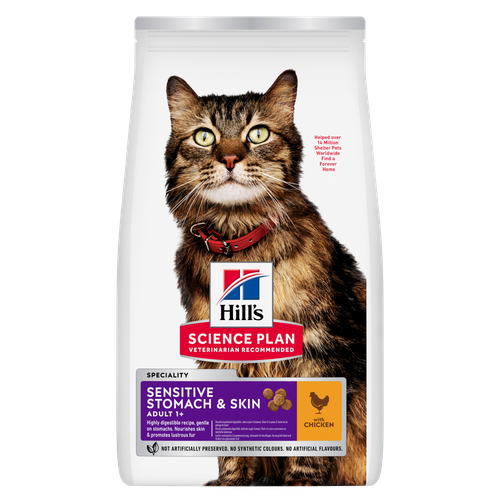 Sensitive Stomach & Skin Kattefoder
Sensitive Stomach & Skin KattefoderHill's Science Plan Sensitive Stomach & Skin Adult kattefoder med kylling er et komplet foder til voksne katte, der understøtter en sund fordøjelse og optimal hudpleje.
køb nu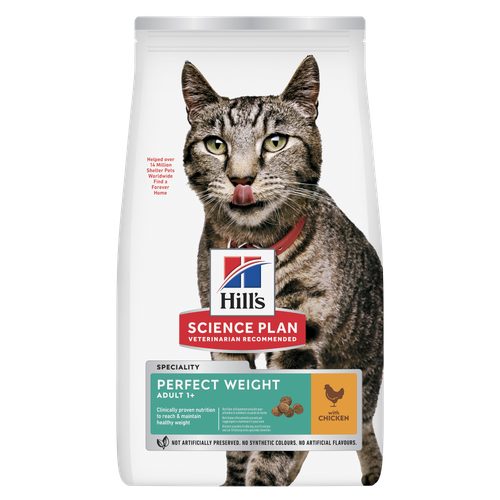 Perfect Weight Adult kattefoder med kylling
Perfect Weight Adult kattefoder med kyllingHill's Science Plan Perfect Weight Adult Kattemad med kylling er klinisk dokumenteret ernæring til at opnå og bevare en sund vægt.
køb nu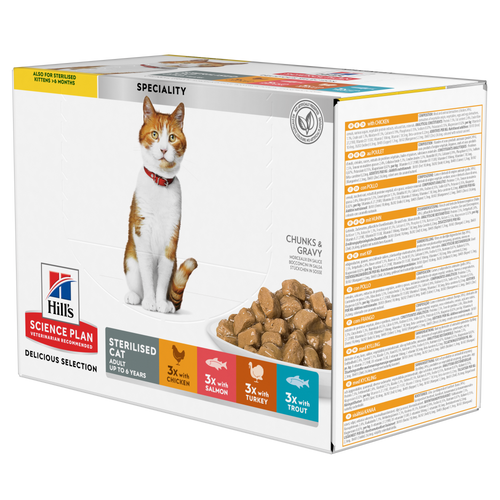 Sterilised Cat ADULT Kattefoderkøb nu
Sterilised Cat ADULT Kattefoderkøb nu -
Killing
-
Til hundeejere
- Hundetips og artikler
-
Hundesundhedskategori
- Vægthåndtering
- Foder- og miljøfølsomheder
- Urinveje
- Fordøjelse
- Led
- Nyre
-
Hundens livsstadie
- Hvalpeernæring
- Voksenernæring
- Seniornering
Til katteejere- Kattetips og artikler
-
Kattesundhedskategori
- Vægthåndtering
- Hud- & foderfølsomheder
- Urinveje
- Fordøjelse
- Nyre
-
Kattens livsstadie
- Killingeeræring
- Voksenernæring
- Seniorernæring
Udvalgte artikler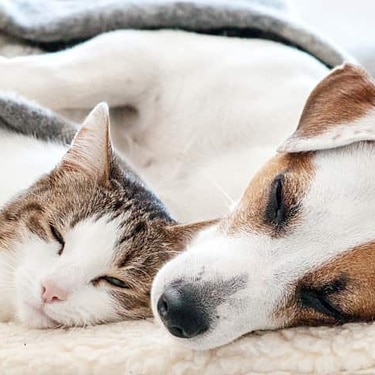 Sådan tager du din hunds eller kats temperatur
Sådan tager du din hunds eller kats temperaturAt lære at tage din hunds temperatur (og endda din kats temperatur) er et tydeligt bevis på, at en kæledyrsforælder er engageret i dit kæledyrs sundhed.
læs mere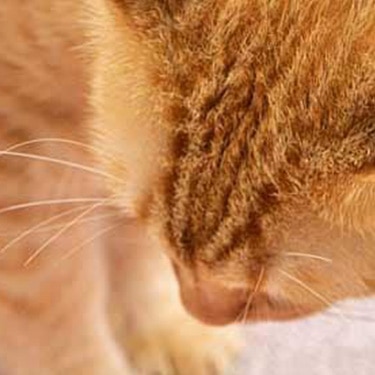 Krystaller og sten i urin hos hunde og katte
Krystaller og sten i urin hos hunde og katteLær om årsagerne til og behandlingerne af krystaller i urin hos hunde og katte, så du kan bevare deres sundhed. Besøg Hill's Pet DK og få omfattende råd om sunde urinveje.
læs mere Opnåeligt nytårs opløsninger med dit kæledyr | Hill's Pet
Opnåeligt nytårs opløsninger med dit kæledyr | Hill's PetVi kender dem alle..nytårsforsæt! Mange af os sætter os mål for det nye år, som vi ikke altid når.
læs mere -


Hvad er fodersensitivitet eller foderintolerance?
Lider din kat af hyppige fordøjelsesbesvær, kløende hud eller uforklarligt ubehag? Det kan være tegn på intolerance eller sensitivitet over for kattefoder. I denne vejledning undersøger vi årsager, symptomer og de bedste ernæringsmæssige løsninger til at holde din kat glad og sund.
Fodersensitivitet hos katte er noget lidt andet end foderintolerance. Sensitivitet er en immunreaktion, som oftest over for et protein. Intolerancer er en unormal reaktion på en foder eller et tilsætningsstof i foderet. Uanset om din kat har en sensitivitet eller en intolerance, er diagnosen og behandlingen den samme, så du behøver ikke at hænge dig i forskellen. Begge dele er kendt som en uønsket foderreaktion (AFR) eller sensitivitet.
Sensitiviteter kan vare hele livet, så ingrediensen skal fjernes permanent fra din kats foder. Det er værd at huske på, at din kat også kan have sensitiviteter over for mere end ét protein.
Hvad forårsager fodersensitivitet eller foderintolerance?
De mest almindelige årsager til fodersensitivitet hos katte er bl.a. følgende:
- Protein: Sensitivitet er oftest forbundet med proteinkilder, normalt fra kylling, oksekød, fisk eller mejeriprodukter i din kats foder.
- Skade: Betændelse, infektion, operation og visse former for medicin kan skade fordøjelsessystemet og føre til uønskede foderreaktioner.
- Race: Visse katteracer ser ud til at være mere tilbøjelige til at udvikle fodersensitiviteter, herunder siameser katte.
Det kan tage måneder eller år, før din kat udvikler en sensitivitet over for et bestemt foder. Men når de først har udviklet en, vil de næsten altid få en uønsket reaktion på det pågældende foder.
Hvad er kendetegnene på fodersensitiviteter hos katte??
De mest almindelige tegn på fodersensitivitet eller foderintolerance hos katte er:
- Fordøjelsesbesvær
- Kløende hud, der varer ved året rundt, især i ansigtet, ørerne og på halsen
- Overdreven selvpleje og relateret hårtab på maven og siderne
- Et ujævnt, skorpet hududslæt
Andre tegn på fodersensitivitet kan være følgende:
- Sløvhed
- Tegn på maveubehag. Det kan være så subtile tegn som mindre leg eller at katten trækker sig fra familien.
- Dårlig pelskvalitet
- Luft i maven
- Hyppig kradsen
- Rødme i huden
- Dårlig vækst
- Hoste, hvæsende vejrtrækning eller nysen
- Kroniske øreproblemer
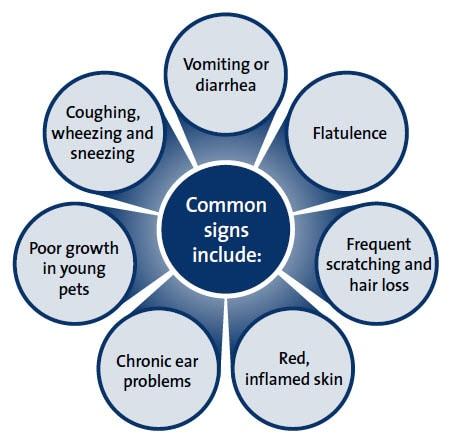 Da der er mange andre tilstande, hvoraf nogle er alvorlige, som har de samme symptomer som fodersensitivitet og foderintolerance, er det vigtigt at opsøge din dyrlæge, hvis du bemærker nogle af disse tegn.
Da der er mange andre tilstande, hvoraf nogle er alvorlige, som har de samme symptomer som fodersensitivitet og foderintolerance, er det vigtigt at opsøge din dyrlæge, hvis du bemærker nogle af disse tegn.
Fodersensitivitet vs. miljøbetinget sensitivitet hos katte
Katte kan være sensitive over for mange ting udover foder. Miljøbetinget sensitivitet kaldes atopi eller atopisk dermatitis. Dette kan give hudproblemer hos katte, der er næsten identiske med en fodersensitivitet. Miljømæssige allergener er ting som støv, husstøvmider, lopper, pollen, græs og skimmelsvamp osv. Selvfølgelig kan visse uheldige katte have både en miljømæssig sensitivitet og en fodersensitivitet. Visse af disse kan også manifestere sig som katteastma med vejrtrækningsproblemer. Din kat kan også have en kontaktsensitivitet over for noget i dens omgivelser, f.eks. en foderskål af plastik.
Din dyrlæge vil muligvis tage prøver fra huden eller blodprøver for at afklare, hvorvidt der er tale om atopi. Få mere at vide om atopi hos katte.
Hvordan diagnosticeres fødevaresensitiviteter og -intolerancer?
På grund af overlappet med miljøsensitiviteter kan det tage lidt tid at diagnosticere en fodersensitivitet – og man skal bruge en logisk, trinvis måde til at gå frem på. Hav tålmodig med din dyrlæge, mens vedkommende undersøger den bagvedliggende årsag.
Den enkleste måde at diagnosticere en uønsket foderreaktion på er ved hjælp af en såkaldt fodertrail. Det er, som navnet indikerer, en periode med et særligt foder, som din kat ikke reagerer på. De fleste dyrlæger bruger nu et hydrolyseret foder hertil. Her er proteinerne blevet spaltet til bittesmå fragmenter, som er for små til at blive genkendt af din kats immunsystem. Foderet har som regel en kulhydratkilde, der er raffineret for at sikre, at der ikke er proteinelementer, som kan fremkalde en reaktion. I teorien kan et sådan type foder gives til alle katte, der har en uønsket foderreaktion.
Ved fordøjelsesbesvær i forbindelse med fodersensitiviteter ser man normalt en markant forbedring i løbet af 2-4 uger. Ved hudproblemer kan det være nødvendigt at give katten det specielle foder i 12 uger, fordi huden tager længere tid om at hele end tarmen.
Det er meget vigtigt i denne periode at sikre, at der ikke gives andet foder eller godbidder, da du ellers kan ødelægge hele fodertrailen og være nødt til at starte forfra.
Når perioden med fodertrailen er afsluttet, og din kat er blevet symptomfri, kan du blot fortsætte med det samme foder, hvis din dyrlæge vurderer, at det er passende. Eller, hvis du gerne vil kunne tilbyde din kat mere variation, kan du udføre foderprovokationer for at finde ud af præcis, hvad der er årsagen til problemet. Det gør du ved at fortsætte med foderet fra fodertrailen og derefter tilføje en proteintype i et par uger for at se, om symptomerne begynder at vise sig igen. Du kan f.eks. tilføje lidt kogt kyllingebryst som topping hver dag. Hvis det fungerer fint i et par uger, kan du prøve med oksekød, osv. På den måde kan du måske fodre din kat med normalt kattefoder, hvor du blot undgår de ingredienser, der skaber problemerne.
Nogle laboratorier tilbyder blodprøver for fodersensitiviteter. Brug ikke dine penge på dem. På nuværende tidspunkt er disse endnu ikke pålidelige i forbindelse med fodersensitiviteter. Blodprøver for miljøsensitiviteter er pålidelige og kan være nyttige, når man overvejer behandlingsmulighederne.
Hvad er det bedste foder til katte med fodersensitivitet og -intolerance? Er der sikre foderalternativer?
Som sagt, hvis du finder ud af, hvad din kat reagerer på, kan du overveje at give den et kvalitetsfoder, som ikke indeholder den pågældende ingrediens. Dette kan være vanskeligt i nogle tilfælde, fordi ikke alt foder oplyser alle ingredienser, og nogle katte har sensitivitet over for flere forskellige ingredienser. I disse tilfælde anbefaler vi almindeligvis en af følgende muligheder:
- Hydrolyseret foder er det, vi beskrev i forbindelse med fodertrails. Det er foder, hvor proteinerne er spaltet i fragmenter, der er for små til, at kroppen kan genkende dem.
- Foder med ny proteinkilde (novel protein) er dem, hvor proteinkilden er en, som din kat ikke har fået før. Det afhænger selvfølgelig i høj grad af din kats foderhistorik. Almindelige proteiner til dette foder er and, vildt eller kanin, og på det seneste også insektproteinfoder.
Din dyrlæge kan rådgive dig om, hvad der er bedst egnet til netop din kat.
Opsummeret
Fodersensitivitet hos katte er ikke særligt almindeligt, men det forekommer – og når det sker, varer det ved resten af livet. Når det er sagt, så kan langt de fleste katte med uønskede foderreaktioner leve et helt normalt liv med det rigtige foder. De fleste katteejere vil også finde mindst én ting, de kan give som en ekstra godbid nu og da.
Hvis du er bekymret for, om din kat har en mulig sensitivitet eller et andet helbredsproblem, bør du søge råd hos din dyrlæge så hurtigt som muligt. Jo hurtigere du kommer til bunds i problemet, jo hurtigere vil din kat få den rette lindring, og jo mindre skade vil der ske. Når alt kommer til alt, vil vi jo alle sammen gerne have så lang tid som muligt med vores firbenede venner!
Ofte stillede spørgsmål om fodersensitivitet og foderintolerance hos katte
- Hvad er tegnene på fodersensitiviteter hos katte?
De mest almindelige tegn på fodersensitiviteter hos katte er følgende- fordøjelsesbesvær
- kløende hud, der varer ved året rundt, især i ansigtet, på ørerne og på halsen
- overdreven selvpleje og relateret hårtab på maven og siderne
- et ujævnt, skorpet hududslæth
- Hvordan diagnosticeres fodersensitivitet hos katte?
Dette gøres med et fodertrail. Normalt anvender man et foder med hydrolyseret protein. Det kan være i op til 12 uger i forbindelse med hudproblemer, normalt mindre for fordøjelsesbesvær. - Hvad er det bedste kattefoder ved sensitiviteter?
Det afhænger helt af din kat, og hvad den er sensitiv over for, og om du har en omfattende foderhistorik. Hydrolyseret foder og foder med en ny proteinkilde er normalt den nemmeste måde at fodre katte med fodersensitiviteter på. - Kan katte vokse sig fra fodersensitivitet?
Langt de fleste katte, der udvikler fodersensitivitet eller -intolerance, har brug for livslang håndtering. Men med det rigtige foder kan stort set alle leve et helt normalt liv.


One of our staff authors prepared this article for you
Skrevet af Dr. Emma Milne BVSc FRCVS og bedømt af Dr. Karen Shenoy DVM.
Related products
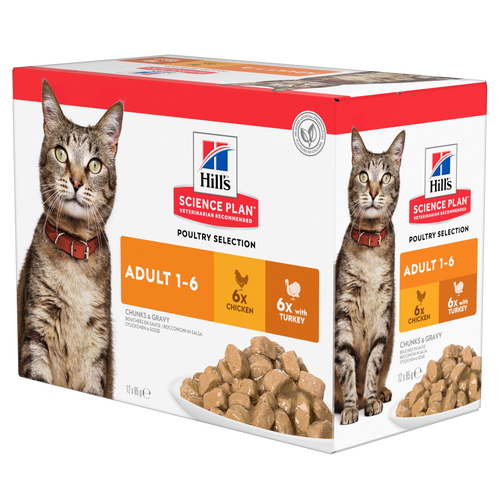

Tender chunks in gravy for cats, with high-quality protein to maintain lean muscle. With vitamin E and omega-3s & -6s for healthy skin and balanced minerals to support healthy vital organs.

Tender chicken chunks in gravy for cats, with L-carnitine and fewer calories for ideal weight management. Packed with high-quality protein, omega-6s, and vitamin E for shiny fur and healthy skin.

Tender chicken chunks in gravy for mature adult cats. Made with easy-to-digest ingredients, high-quality protein for lean muscle maintenance and antioxidant vitamins C+E for optimal health.
Related articles
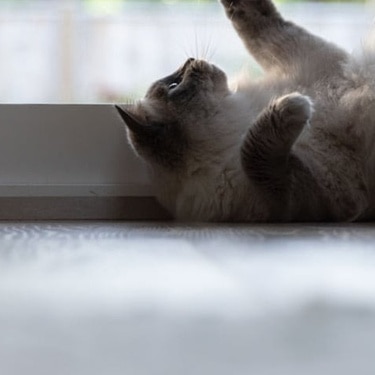
Feeding time can be a wonderful bonding opportunity for you and your cat. Find out how to make the most of it and create a healthy habit with HIll's Pet UK.
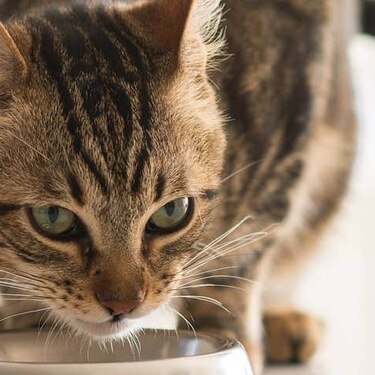
Discover what you can do to spot and support a sensitive cat stomach. See what routines and food you can implement to help your cat be happy and healthy.

Find out about how you can support your cat's digestion to boost overall health. Diet is key to a long and happy life for your cat, so discover what you can do.

Find the right Hill

Put your cat on a diet without them knowing
Our low calorie formula helps you control your cat's weight. It's packed with high-quality protein for building lean muscles, and made with purposeful ingredients for a flavourful, nutritious meal. Clinically proven antioxidants, Vitamin C+E, help promote a healthy immune system.
Put your cat on a diet without them knowing
Our low calorie formula helps you control your cat's weight. It's packed with high-quality protein for building lean muscles, and made with purposeful ingredients for a flavourful, nutritious meal. Clinically proven antioxidants, Vitamin C+E, help promote a healthy immune system.

